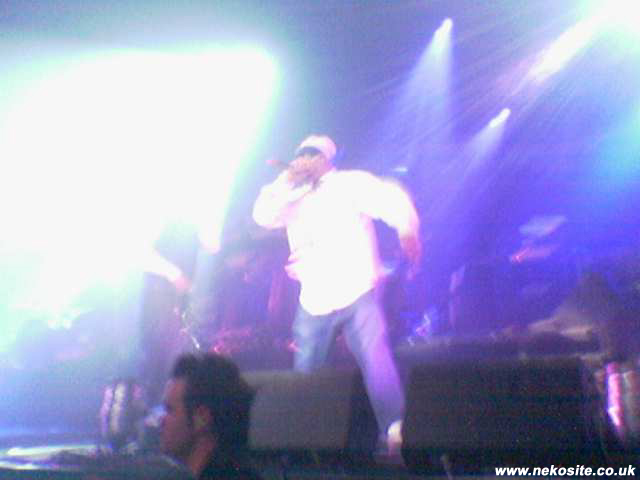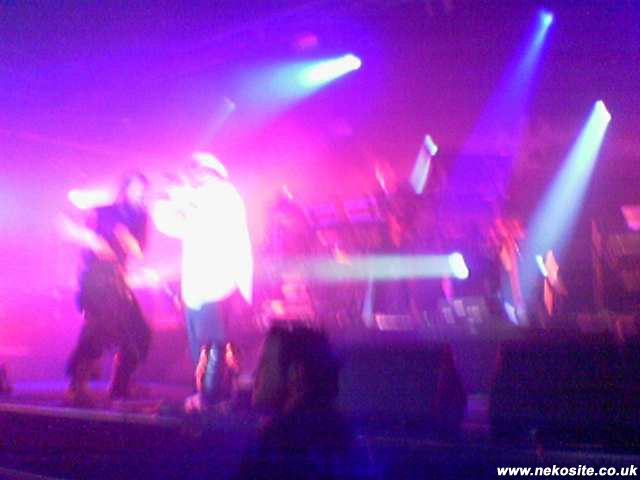#AONO20: Wake Up Call · Kool Keith
Wake Up Call is the sixth track on The Prodigy’s Always Outnumbered, Never Outgunned album, which celebrated its 20th anniversary this year. To honour the occasion, here’s the story of where it all began — how the track was created, where it was recorded, who, besides Kool Keith from Ultramagnetic MCs, contributed vocals to the tune, and what Slayer had to do with it all. This post is part of our #AONO20 series, where we share the detailed story of the album, track by track.
Wake Up Call often goes unnoticed by fans, who tend to dismiss it as just another collaboration or merely a filler tune. However, it is far from a throwaway track — it truly lives up to its name. Its raw and sharp sound hits like a bucket of cold water poured over your head. Unsurprisingly, it served as the band’s live show opener for almost an entire year. Some critics have noted that out of all the tracks on the new album, ‘Wake Up Call’ feels closest to The Prodigy’s earlier work — some heard echoes of ‘Serial Thrilla’, while others pointed to the experimental vibe of ‘Music for the Jilted Generation’.
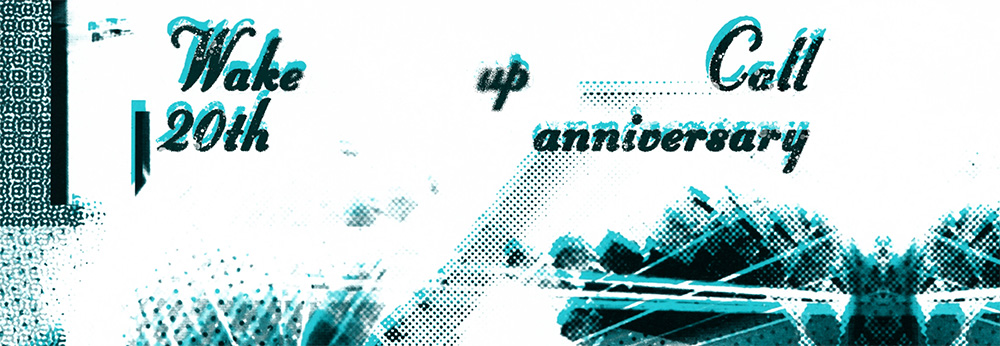
This tune is not just a powerful standalone piece but also a significant milestone for the entire album. ‘Wake Up Call’ was the first one written for the record, marking a turning point for Liam Howlett after the release of the infamous ‘Baby’s Got a Temper’, when Liam scrapped about six new tracks and started fresh with a new direction. For The Prodigy’s mastermind, it was a personal wake-up call, literally — a sudden epiphany, a moment of clarity that, during a difficult time for the band, helped him reconnect with what his music truly stood for.
Liam Howlett for Ron Slomowicz: ‘It was a direct answer to “Baby’s Got A Temper” in the way I wanted to implant an alarm clock in my head and go, ‘Wake up! Remember what you’re about, you’re about the beat, and remember you’re about achievement.’ A wake-up call to write a record that made myself remember about that sort of stuff’.
Like most of the material for the album, ‘Wake Up Call’ was written by Howlett at home in his own bedroom, as he used to do when he was younger. Now he sketched out the beats, programming, basic layout, and the initial vibe in Reason before heading to the studio to refine the demos.
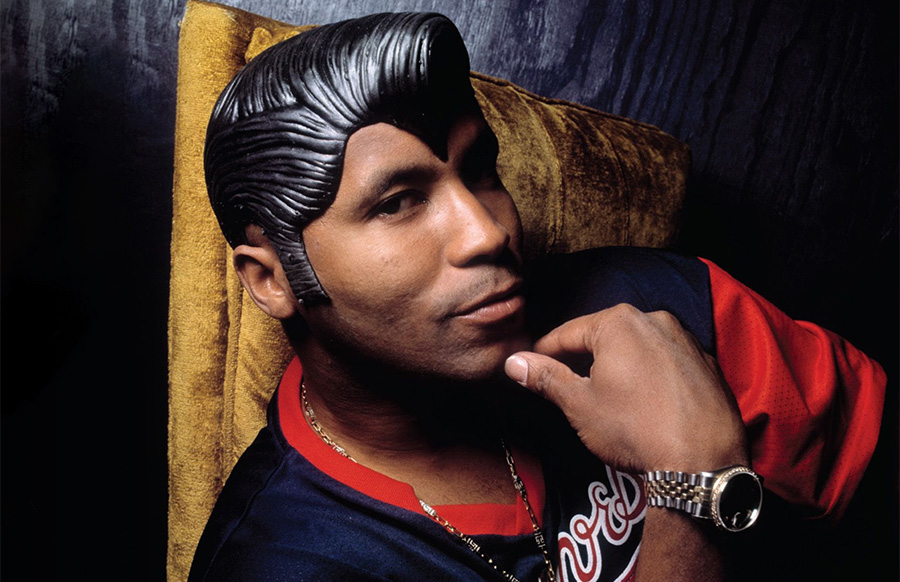
The main vocal sample comes from Kool Keith, the Ultramagnetic MCs emcee and Howlett’s longtime favorite. Since The Prodigy’s early days, Liam’s admiration for Kool Keith and his band has been an ongoing theme, with Keith almost like “the fifth member of The Prodigy”, as Howlett often acknowledged. Their creative relationship began in the early 1990s when Howlett sampled Ultramagnetic MCs’ ‘Critical Beatdown’ on the iconic track ‘Out of Space’, laying the groundwork for future collabs. In 1996 they worked together again on the track ‘Diesel Power’ from ‘The Fat of the Land’, which was another milestone for Howlett — creating something new totally from scratch with his hero, not just using his samples.
A few years later, the idea of recording another track together came from Kool Keith himself: he reached out to Liam as soon as he heard about the then upcoming record. “Kool Keith approached me in 2002, when he heard I was writing another Prodigy album and he wanted to get involved” Howlett told Ron Slomowicz.
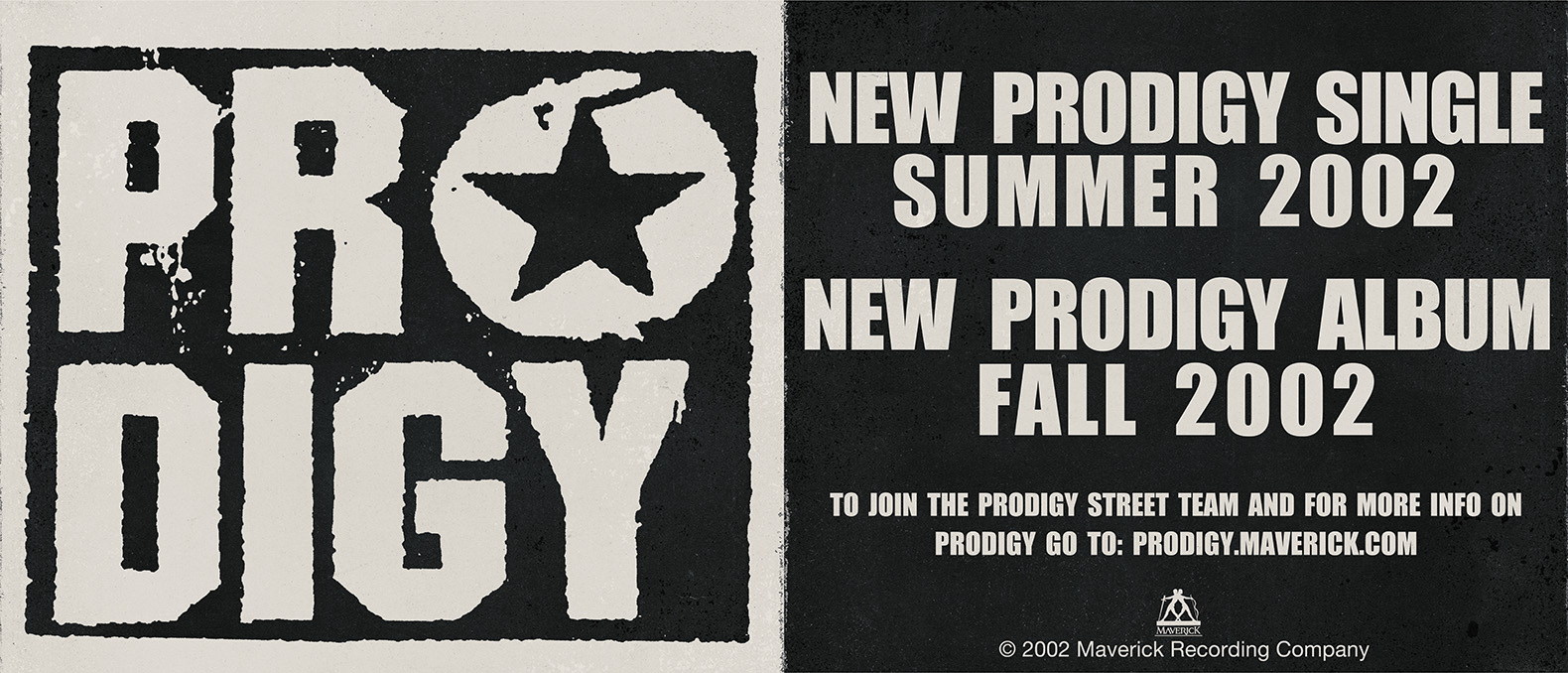
The track titled ‘Wake Up’ was first mentioned in 2003 when a photo of a note from Liam appeared on the website of the band’s label, XL Recordings. The note was addressed to XL staff, instructing them to pass the message to Kool Keith’s management.
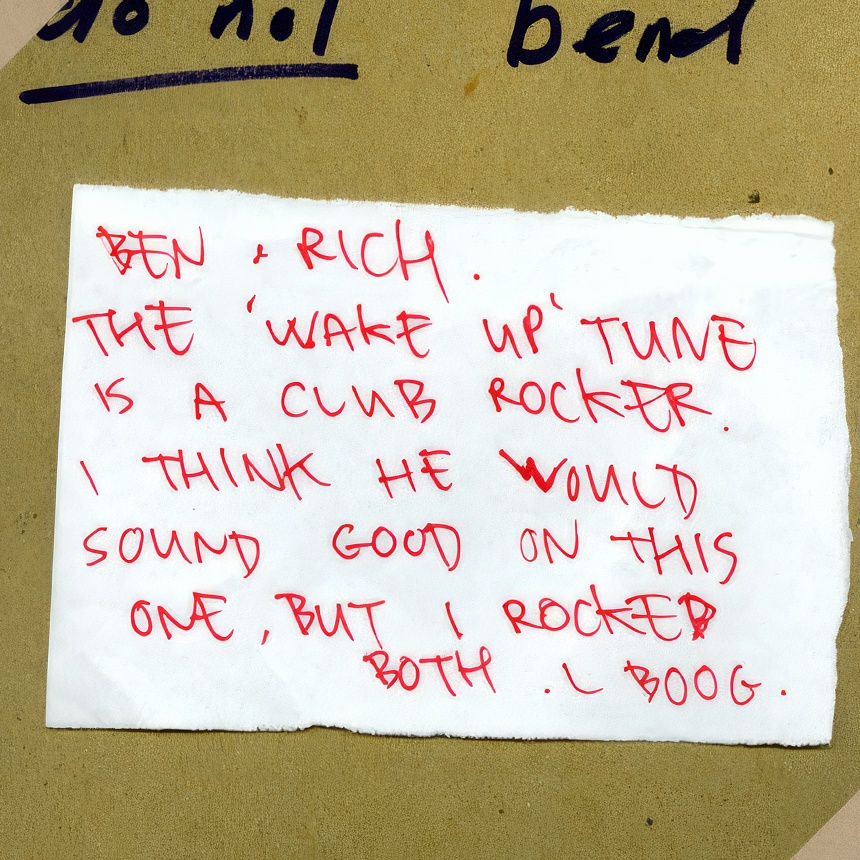
In the note, Liam clearly mentions two demos. So, what’s the second tune being referred to? As it turns out, Howlett was working on ‘Girls’ at the same time as ‘Wake Up Call’ — it was the second finished track for the new album. At one point, the two tracks were even interconnected, as Kool Keith’s vocals were initially planned to be included in ‘Girls’ as well.
Liam Howlett for Neko: “That’s right, yeah. The second one I did with Kool Keith was actually a part of ‘Girls’ – at the end of ‘Girls’. It was basically all the beats of ‘Girls’ all slowed down and Kool Keith came in and did like one verse of lyrics. But in the end that didn’t work, so that got shelved.”
As with ‘Diesel Power’, the vocals on ‘Wake Up Call’ were recorded remotely, and it wasn’t until 2005 that the artists met in person. Walking down the street during the Australian tour, Howlett saw a poster for Kool Keith’s show at same city — in a result they performed together at a show in Melbourne on 10 March. But guys didn’t perform ‘Wake Up Call’ jointly, only ‘Diesel Power’ and ‘Smack My Bitch Up’, apparently this is due to the fact that ‘Wake Up Call’ is the very first track from the show, and it wouldn’t be as cool if Kool Keith came out right at the beginning of the gig.
Interestingly, ‘Wake Up Call’ and ‘Girls’ were the first new tracks Liam shared with Keith Flint and Maxim. By then, he had already decided not to include their vocals on the album. Howlett told them that he wanted to focus on the music rather than frontmen. For him, it was important to bring back a fresh sound and draw listeners to the music itself. Flint and Maxim were initially puzzled, initially feeling they should be part of the record, but after hearing the new sound, they understood and supported the direction.
Liam Howlett for DJ Times: A lot of people might find it odd, because they might think of us as a traditional band, but we’re more erratic than that, and I never wanted to limit myself to having a vocalist on one record all the way through. The main thing [for Keef and Maxim] was that we could play it live, and there’s about five or six tracks on this record that will play live.
Though the version of ‘Wake Up’ that made it to the album is a pretty stripped-down take, Howlett initially recorded a full rap version with Kool Keith, which was even intended as a potential B-side. “We didn’t want the record to be too collaboration-heavy”, Howlett explained to Ron Slomowicz, highlighting his focus on maintaining the album’s balance: “I wrote a record I wanted to play live and not have too many guests”. Still, back in October 2005, Howlett hinted to Neko at the full vocal track’s possible release on their website. Unfortunately, it never happened.
One way or another, a line from that Kool Keith session is well-known to fans: “Turn of the times, futuristic”. In 2005, it found its way into the track Voodoo Beats, released on the compilation album ‘Their Law.’ The beats, originally recorded for live gigs back in 1997, initially sampled the line from Chill Rob G’s track ‘Let The Words Flow’: “My style’s unorthodox, but of course it rocks”. However, since the rights to the sample couldn’t be cleared, the piece from the full version of ‘Wake Up Call’ came in to replace it.
- Vocal Sample: ‘Turn of the times, futuristic’
In addition to Kool Keith, the track also features female vocals, one of which belongs to Hannah Robinson, who contributed several lines for ‘Wake Up Call’ and ‘Hotride.’ Now a British music producer with dozens of hits written for artists like Lana Del Rey, Kylie Minogue, and others, Hannah was just starting her journey as a session vocalist at the time. We had the chance to speak with Hannah, and she shared her perspective on the recording process.
Hannah Robinson for All Souvenirs: “[I got involved with The Prodigy through] my manager at the time, Sandy Dworniak, [who] managed Neil McLellan — she knew they were looking for some extra vocals, so put me up for it. I think I’d just done some work with Neil and Carl Cox, so we’d already met”
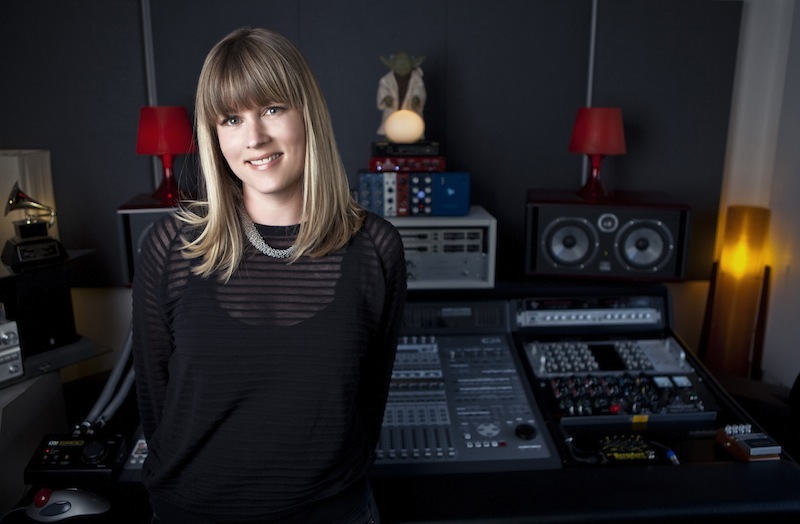
It seems that Liam captured a similar vibe to ‘Girls’, wanting to add a touch of sexiness to the edgy, jittery feel of ‘Wake Up Call’. Neil and Liam had a clear vision for the lines they wanted and helped Hannah deliver her best performance during that one session. It lasted no more than a couple of hours — they tried out plenty of ideas in different styles, but only a few made it onto the album.
Hannah Robinson for All Souvenirs: “Liam was definitely there, as I remember how nervous I was! I’d not that long before seen them headline the V Festival. They were possibly one of the best live acts I’d ever seen, so to suddenly be in a room adding vocals to some of their tracks was a bit of a fever dream. Neil was also there and they were both equally involved. They both had an attention to detail and a vision for the album as a whole. They had all these ideas flowing and would just bounce off each other.”

The track also includes a flute section by Jim Hunt, adding to the signature Prodge flair. Howlett’s affinity for flute sounds stretches back to ‘Music for the Jilted Generation’, where he sampled Jonny Pate’s work on ‘Voodoo People’, and invited Phillipp Bent to play on ‘3 Kilos’ (we recently interviewed Phil for our forthcoming behind-the-track feature celebrating the 30th anniversary of ‘Jilted Generation’). Liam also mentioned Jim Hunt in an interview for DJ Times, issued in December 2004. Notably, in 2005, Howlett also invited flautist Nathan Lee to perform on ‘Poison’ live at Radio One’s Maida Vale session on 14 September 2005.
Liam Howlett for DJ Times: “It all starts with me in the studio. I didn’t get too many players on this record—just a flute player and the assistant engineer [Mike Horner] on guitar.”
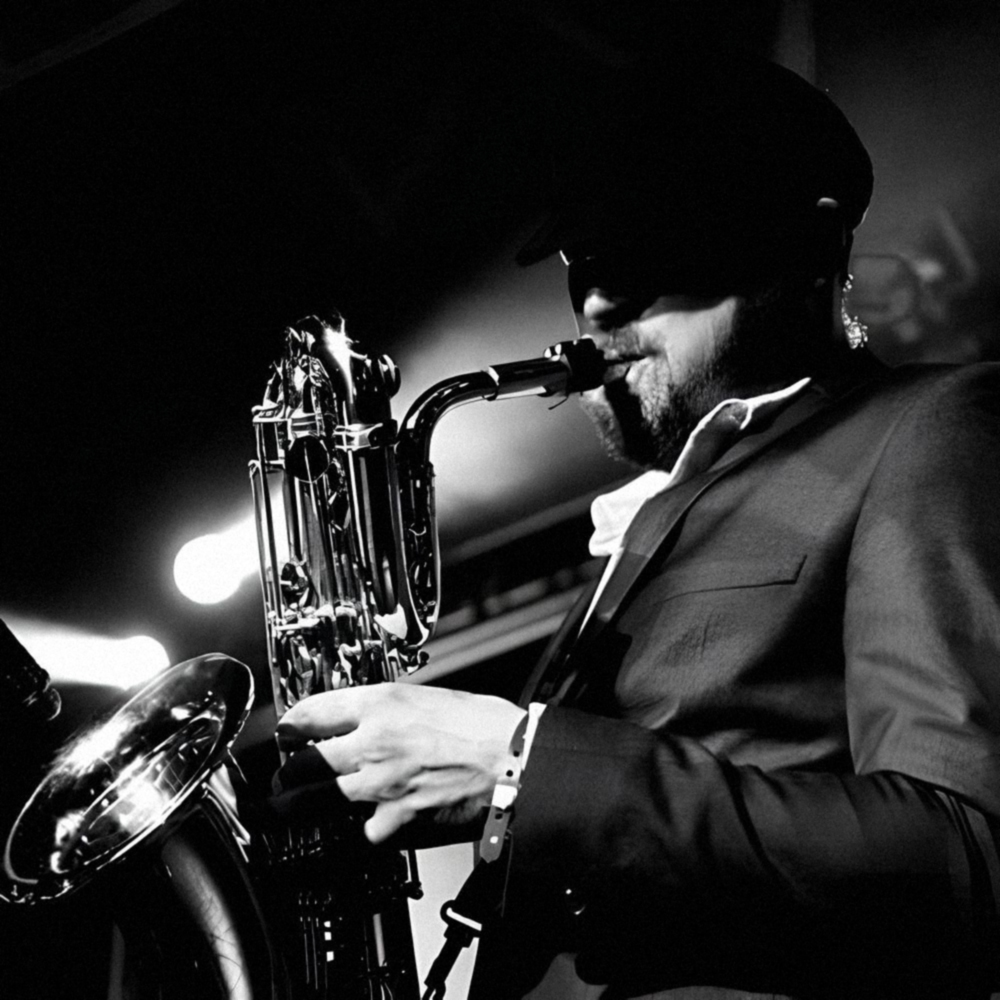
In true Howlett fashion, no track of his is ever complete without some obscure samples, and ‘Wake Up Call’ is no exception. This time, the alarm bell was lifted from Pink Floyd’s ‘Time’, while the raw, growling guitar intro originated from Slayer’s ‘South of Heaven’. This riff was also chopped up for Psychedelic Skratch Bastards’ iconic ‘Battle Breaks’ DJ battle tool vinyl, a favourite sampling source for Liam back in the day. Zero-G’s iconic libraries also left their mark, with a break from their 2002 ‘Chemical Beats’ collection featured on the track.
- Sample: guitar
- Sample source: Psychedelic Skratch Bastards – Side B: Mud Cuts [Battle Breaks, 1992]
- Original source: Slayer – South Of Heaven [South Of Heaven, 1988]
- Sample: alarm clock bell
- Sample source: Pink Floyd – Time [The Dark Side Of The Moon, 1973]
- Sample: stab (at 1:04)
- Sample source: Zero-G – Chemical Beats [2002] – CB Stab-21
- Original source: Coldcut – Beats + Pieces (Mo’ Bass Remix) [Beats + Pieces, 1987]
In October 2004, ‘Wake Up Call’ was performed live for the first time. Its premiere took place on October 1 in Athens during the band’s first show in two years, kicking off their tour in support of the new album. For the slightly reworked live version, Maxim came up with new lyrics that stood apart from his usual freestyle approach.
Liam Howlett for Neko: “I’m excited how the tracks can evolve now for live. I guess it’s the same for a lot of bands, changing arrangements and speeds of tunes to fit in with the right vibe. I’ve worked on ‘Wake Up’ and ‘Girls’, they kind of sound the same but they are more pumped – it gives it a different fresh angle.”
This inspired Liam to consider releasing a full vocal version of the track featuring both Kool Keith and Maxim. On 17 December 2004, Liam mentioned this idea in his blog, also noting that ‘Wake Up’ was even being considered as one of the potential singles from the album. It never happened as well.
Liam Howlett in his blog: “I have new tracks like ‘Wake Up’ (full vocal version), ‘Warning’ and ‘Ded Ken’, but they are all potential singles after ‘Spitfire’, so they won’t be on b-side. […] I’m feelin’ ‘Wake Up’ full rap – Kool Keith w/ Maxim, yeah out”
Before performing the upgraded version of ‘Wake Up Call’, the band debuted a fresh live intro, built around a sample from the track. Officially called Wake Up Intro, it was recently reconstructed from scratch by our team. We are excited to share this version with you!
A little later, inspired by Nightbreed’s remix of ‘Spitfire’, Liam created a faster version of the track titled Wake The Fuck Up. We’ll discuss it in more detail in future articles, but for now, it’s worth mentioning that Kool Keith was officially credited as a co-author of ‘Wake The Fuck Up’, even though his vocals don’t appear on the track. Why this was done remains unclear.
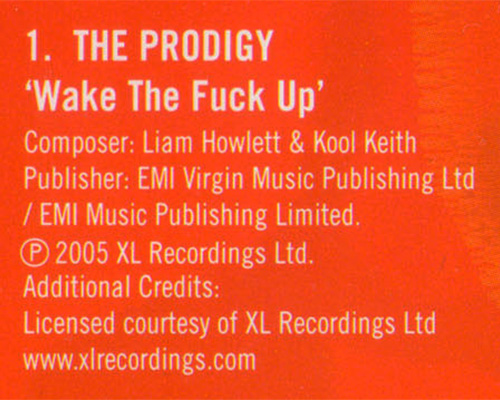
‘Wake Up Call’ was a true breakthrough for Liam Howlett, reinvigorating his creativity and confidence. Ultimately, it gave the entire album its drive and brought a fresh energy to the band’s live performances. With this, the story of the track can be considered complete.
In the next #AONO20 post, we’ll share the most comprehensive story behind the making of Action Radar, where the lead vocal part was performed by Liam’s old mate, artist Paul Jackson, also known as DirtCandy.
Headmasters: SIXSHOT, SPLIT
Additional thanks to: Hannah Robinson
Donate
- Tether (USDT)
Donate Tether(USDT) to this address

